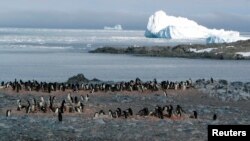BERLIN, GERMANY —
An international commission is considering whether to designate the waters around Antarctica special marine reserves, a step campaigners say would safeguard the habitat of whales, seals and penguins and more than double the world's protected sea area.
Any change in status requires a unanimous decision by the 25 members of the Commission for the Conservation of Antarctic Marine Living Resources (CCAMLR). Two members, Russia and Ukraine, have raised legal concerns, a German delegate told a media briefing on Monday.
The Russian and Ukrainian delegations were not immediately available for comment.
CCAMLR was founded in 1982 to protect Antarctic marine life. The United Nations has committed to classifying 10 percent of the world's coastal waters and oceans as protected areas by 2020 - up from 2 percent at present.
Last November CCAMLR members, which include the European Union, Norway, China, Australia and New Zealand, failed to agree on setting up marine protected areas (MPA) amid disputes over scientific findings, the duration of the protection period, and a reluctance by some to shut off commercial access to new fishing waters.
At a new fresh round of talks beginning in the German town of Bremerhaven on Monday, delegates will examine a U.S. and New Zealand-backed proposal on preserving the Ross Sea, which is seven times the size of Germany, and a European Union, France and Australia-backed proposal for the waters of East Antarctica.
In an open letter to Vladimir Putin, the Ocean Elders campaign group appealed for the Russian president's support.
“The Ross Sea and East Antarctica have been spared the impact of widespread pollution, invasive species, bottom trawling and other large-scale commercial fishing operations that are imperiling other marine areas around the world."
“But conditions are changing, and the need to take steps to better protect key areas in the Southern Ocean is compelling,” the letter to Putin said.
Some fishing fleets are looking south because stocks nearer home are depleted and some nations worry about shutting off large areas of the oceans.
“The Ross Sea region is one of the last and greatest ocean wilderness areas on the planet. It is home to a unique and productive ecosystem,” the U.S. Department of State said in a statement. “It is also a natural laboratory for scientific study to better understand climate change, our oceans, and our world.”
Any change in status requires a unanimous decision by the 25 members of the Commission for the Conservation of Antarctic Marine Living Resources (CCAMLR). Two members, Russia and Ukraine, have raised legal concerns, a German delegate told a media briefing on Monday.
The Russian and Ukrainian delegations were not immediately available for comment.
CCAMLR was founded in 1982 to protect Antarctic marine life. The United Nations has committed to classifying 10 percent of the world's coastal waters and oceans as protected areas by 2020 - up from 2 percent at present.
Last November CCAMLR members, which include the European Union, Norway, China, Australia and New Zealand, failed to agree on setting up marine protected areas (MPA) amid disputes over scientific findings, the duration of the protection period, and a reluctance by some to shut off commercial access to new fishing waters.
At a new fresh round of talks beginning in the German town of Bremerhaven on Monday, delegates will examine a U.S. and New Zealand-backed proposal on preserving the Ross Sea, which is seven times the size of Germany, and a European Union, France and Australia-backed proposal for the waters of East Antarctica.
In an open letter to Vladimir Putin, the Ocean Elders campaign group appealed for the Russian president's support.
“The Ross Sea and East Antarctica have been spared the impact of widespread pollution, invasive species, bottom trawling and other large-scale commercial fishing operations that are imperiling other marine areas around the world."
“But conditions are changing, and the need to take steps to better protect key areas in the Southern Ocean is compelling,” the letter to Putin said.
Some fishing fleets are looking south because stocks nearer home are depleted and some nations worry about shutting off large areas of the oceans.
“The Ross Sea region is one of the last and greatest ocean wilderness areas on the planet. It is home to a unique and productive ecosystem,” the U.S. Department of State said in a statement. “It is also a natural laboratory for scientific study to better understand climate change, our oceans, and our world.”





